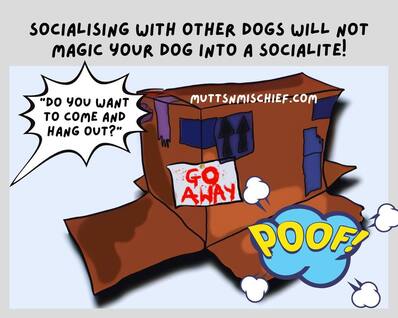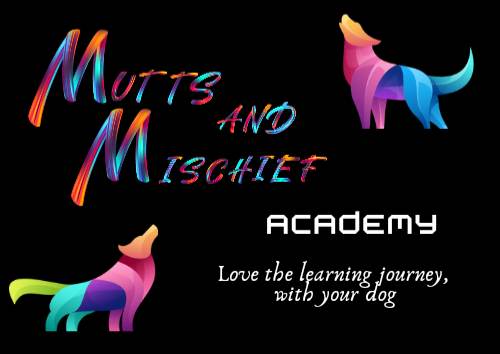 Why did you bring a dog into your family? Audio link: https://youtu.be/F_U8ss46f7g?si=0Dc_7ZhxrHQsjoKW I brought a dog into my family because I needed that companionship, unconditional love, uncomplicated love, a companion to have adventures with and share my life with. I think it's really important that this difficult topic is addressed. Socialisation. Dogs just like us don't want to be friends with every dog that they meet. We need to rebuild the new normal, if friends and family have dogs it doesn't mean that your dog's are going to get along. You choose your best friend but your dog's choose who they also feel comfortable with. Your dog is amazing just the way they are and they are your companion. Not your best friends dog, not your parents dog, not your friends dog. They are your companion and yours alone. Love them for that very special role! Did you know puppy parties and classes are an outdated 50 year old rhetoric? There is no evidence today in science that puppy parties or classes are in any way helpful to dogs and could in fact be the opposite. It's down to the breeders during the critical and sensitive periods to expose puppies to socialisation experiences, this is not synonymous with playing with other puppies. Early socialisation experiences for puppies with breeders looks like; early scent introduction (ESI) or early neurological stimulation (ENS) with neonatal puppies. ENS promotes physiological health, improves cardiovascular activities, strengthens adrenal glands, builds a higher resistance to disease, stress tolerance and resilience. (1) ESI or early scent introduction begins at the age of day 3 through to day 16 of the puppy's life for only one minute per day but begins to open the neurological pathways and can enhance the neurological performance for puppy's throughout their life through touch and scent as early neurological stimulation (ENS) is combined with ESI. (2) Breeders will also expose to children where possible, car journeys, the vets, sounds and different textures. Once they are adopted into their new family it is then up to the new guardians to continue with socialisation to novel situations and situations that they will experience as they become an adult and are an adult. This could be getting used to traffic in urban environments, it could be desensitisation to bird scarers in a rural environment, it could be that the vets or the pet shop is on an industrial estate so getting used to the sounds of shutters and fork lifts can be helpful. It could be that you live by a school, a construction area, a fire station, police or paramedic station. In which the main desensitisation needs is to sirens. It's also really important to focus on socialising with your vet as this person is going to be a constant in your dog's life as well as the socialisation to the surgery, the sounds and smells and of course the groomer, should you have a breed which requires grooming. Unfortunately, like much of the industry, the information we have today is 50 years old, 50 years ago socialisation classes were encouraged based on the information that they had then. Which in all fairness is very limited. 50 years ago Barbara Woodhouse was also the trainer most guardians looked to, shudder. It's also been found in a much more recent study that different breeds have different socialisation windows and with breed variations this means that different breeds, very much can't just be lumped into a puppy party or socialising class. (3) In 1999, researchers identified very few benefits of puppy classes in a controlled test study and reviewing the results of the puppies behaviour, post puppy classes. (4) These results again stress the importance in further research in truly understanding optimal socialisation windows for dogs based upon their breed. It was also discussed that a major limitation to truly understanding socialisation as a formal study is that although guardian questionnaires can be used, they can be unreliable and biassed and most importantly all puppies live in very different environments which also means the study results will not be consistent for analysis, which is why 50 year old rhetoric is still used today. It also used to be that people didn't think twice about bringing a puppy home at 5, 6, 7, 8 weeks and now it is encouraged that puppies are 12 weeks old before going to their new homes for their optimal development and emotional wellbeing. Epigenetics, maternal instincts and experiences for the puppies with their mother and other environmental factors, secure attachments and Oxytocin levels have also not been tested to develop a baseline of effective socialisation and experiences which shape whether a dog as an adult is likely to become fearful or bite. (5) The other problem is that when dogs become adolescent and emotionally challenged they are relinquished and many stories are told as to why they are relinquished, this also means understanding relinquishment rates is also not reliable as people cannot be counted on to be honest about what they have or haven't done with their puppy which could of led to the “unwanted behaviours.” This is when we see relinquishment of dogs, as they haven't met the idea of companionship of the human. (6) Many guardians I have worked with who had emotionally challenged dogs attended a puppy class or party of some kind and many felt lost, frustrated and first contact a lot of the time was: “If I couldn't help they would relinquish their dog.” I think it's really important that we embrace a new understanding of dogs. We bring dogs into our lives to become family members and sometimes dogs are emotionally challenged for a whole variation of reasons, as discussed in this blog. We need to come to understand that our dog is our companion, not the neighbours dog, not a dog round the block or strange dogs that you bump into. Your dog is your companion and if your dog is emotionally challenged by other dogs, that's OK because your dog is your companion and yours alone. Rethink puppy classes as even the experts don't believe there are any positive associations or benefits for your puppy and begin to embrace setting your puppy up for success in the life you live, the company you keep and the places you travel! References Boone, G. et al. (2022) The effect of early neurological stimulation on puppy welfare in commercial breeding kennels, MDPI. Multidisciplinary Digital Publishing Institute. Available at: https://www.mdpi.com/2076-2615/13/1/71 Cerebral blood flow and personality: A positron emission tomography. (2011). Available at: https://ajp.psychiatryonline.org/.../10.1176/ajp.156.2.252 Morrow M., Ottobre J., Ottobre A., Neville P., St-Pierre N., Dreschel N., Pate J.L. Breed-dependent differences in the onset of fear-related avoidance behaviour in puppies. J. Vet. Behav. Clin. Appl. Res. 2015;10:286–294. doi: 10.1016/j.jveb.2015.03.002 Seksel K., Mazurski E.J., Taylor A. Puppy socialisation programs: Short and long term behavioural effects. Appl. Anim. Behav. Sci. 1999;62:335–349. doi: 10.1016/S0168-1591(98)00232-9. Serpell J., Duffy D.L., Jagoe J.A. Becoming a dog: Early experience and the development of behavior. In: Serpell J., editor. The Domestic Dog: Its Evolution, Behavior and Interactions with People. 2nd ed. Cambridge University Press; Cambridge, UK: 2016. pp. 94–102. Marston LC, Bennett PC. Reforging the bond – towards successful canine adoption. Appl Anim Behav Sci. 2003;83:227–245. Image description: A grey comic book window. The title reads Socialising with other dogs will not magic your dog into a socialite. The window has a cardboard box upside down which has a sign that reads: go away. In red spray paint. Someone is saying off screen: " Do you want to hang out?" A comic style speech bubble reads Poof! Where to recipient of the question has disappeared under the box!.
0 Comments
Leave a Reply. |
BlogFor Mutts & Mischief If you enjoy my blogs and
would like to support my work, you can support me by buying me a Coffee! Archives
July 2024
|
Or are you looking for support and would like to get to know us better?
If the answer is yes then click the image below to join my free facebook group. What is Mutts & Mischief Community?
So it is what it says on the tin! Its a community that is international of Clients and Colleagues with the most supportive and friendly people on the planet. Dog Trainers and Behaviourists from all over the world!
Why did I set up such a mammoth group?
I wanted to have a group exclusively for Clients. For support and to meet uo and build on friendships from Classes or One to Ones. I want Clients to see you are not alone with your Dog and the problem you maybe having that you are not the first and won't be the last! I wanted a safe place where Clients could trade stories good and bad in one place for free!
I also wanted a safe place for the Trainers and Behaviourists I mentor within Social Media Platforms.
Why do this for free?
Because when I say I offer an holistic service I really do. It isn't about the money it is about you and your dogs. You and your dogs are all that matter.
So I wanted to encourage people to do homework and build better quality relationships with their dogs. So 3 years ago I had a mad idea and set up the 100 days of dog training challenge. Once a day people would spend 5 minutes plus training their dog. Recording it and uploading their video onto the Community. Every participant recieved a Certificate.
What I didn't count on was how many Professionals wanted to join and how fast word would spread. So this year 2020 I set up a 366 days of dog training challenge.
We have Clients in America, Greece, Norway, Denmark and Spain. We have Trainers from Greece, Norway, Isle of Wight, America and many more Countries. As well as dog trainers and trainee behaviourists: I mentor all over the world.
So again yes this group is free. It is still primarily for clients and for people to get to know me but we also have the challenge running. Again for free. So if you want to join click the image below to be taken to the group directly. See you there!
So it is what it says on the tin! Its a community that is international of Clients and Colleagues with the most supportive and friendly people on the planet. Dog Trainers and Behaviourists from all over the world!
Why did I set up such a mammoth group?
I wanted to have a group exclusively for Clients. For support and to meet uo and build on friendships from Classes or One to Ones. I want Clients to see you are not alone with your Dog and the problem you maybe having that you are not the first and won't be the last! I wanted a safe place where Clients could trade stories good and bad in one place for free!
I also wanted a safe place for the Trainers and Behaviourists I mentor within Social Media Platforms.
Why do this for free?
Because when I say I offer an holistic service I really do. It isn't about the money it is about you and your dogs. You and your dogs are all that matter.
So I wanted to encourage people to do homework and build better quality relationships with their dogs. So 3 years ago I had a mad idea and set up the 100 days of dog training challenge. Once a day people would spend 5 minutes plus training their dog. Recording it and uploading their video onto the Community. Every participant recieved a Certificate.
What I didn't count on was how many Professionals wanted to join and how fast word would spread. So this year 2020 I set up a 366 days of dog training challenge.
We have Clients in America, Greece, Norway, Denmark and Spain. We have Trainers from Greece, Norway, Isle of Wight, America and many more Countries. As well as dog trainers and trainee behaviourists: I mentor all over the world.
So again yes this group is free. It is still primarily for clients and for people to get to know me but we also have the challenge running. Again for free. So if you want to join click the image below to be taken to the group directly. See you there!
Proudly powered by Weebly


